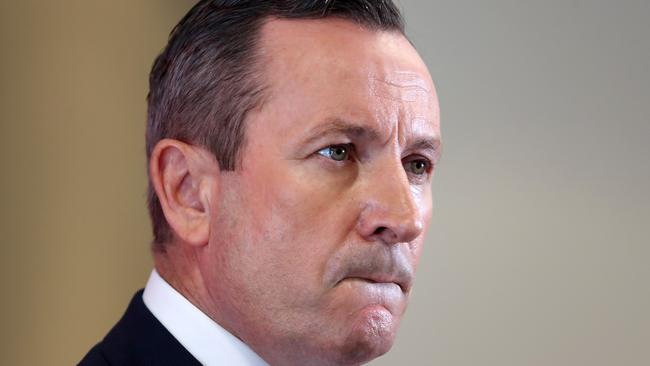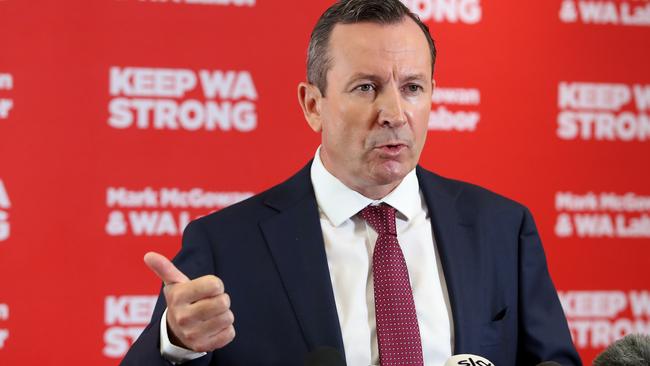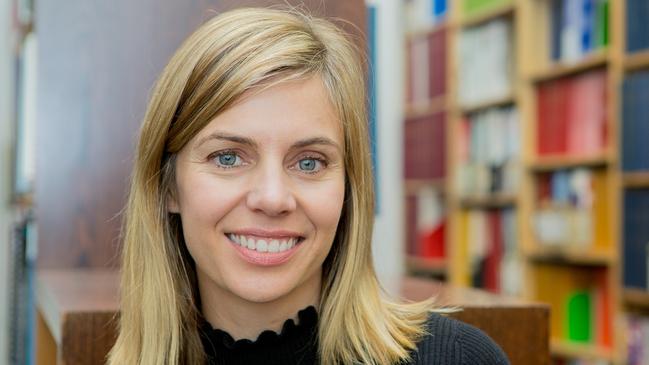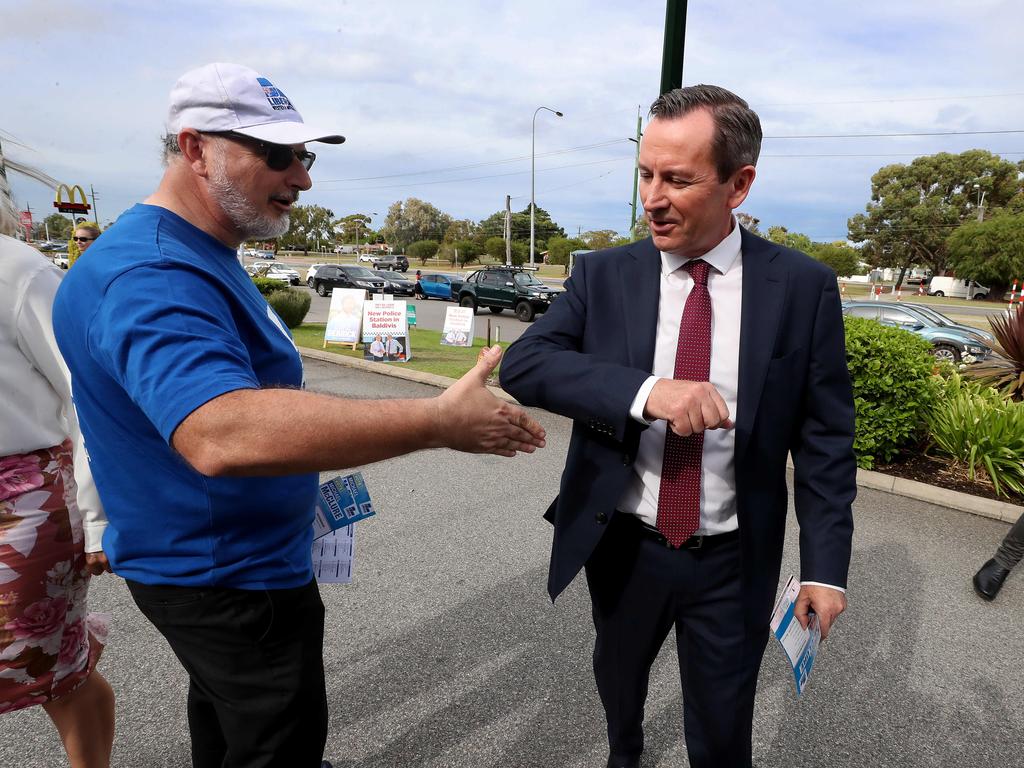
On Sunday, McGowan told the West Australian that border closures had seen a reduction in methamphetamine trafficking into the state. “This is obviously something that will be in place for at least the next year, I would expect, and if we need to extend it beyond that, that’s something I’m certainly willing to talk to the [police] commissioner about because it does help us with dealing with the flow of drugs into the state,” his state.
His rebuttal of anticipated protests from those who would oppose an extension of these already controversial measures was magisterial, erudite, and statesmanlike. “If civil libertarians and the like don’t like that, my argument would be that keeping meth out of Western Australia is very, very important,” he said.
But as he later realised, it is also very, very important to abide by the Constitution of Australia, although admittedly not as important as ensuring McGowan overwhelmingly wins the state election on March 13.
Only in the most exigent circumstances can states lawfully require an internal passport for entry. The pandemic is such a case. Assuming that everyone outside WA is a meth head, however, is not.
This concept should not have been difficult to grasp, especially for someone like McGowan, who possesses a law degree and worked as a legal officer when he was employed by the Royal Australian Navy.
His obsession with treating every problem as something that can fixed by an arbitrary curtailment of liberties is a real issue. When authorities detected one case of COVID by community transmission in January, McGowan ordered that Perth residents lock down for five days.

Far from being the act of a decisive leader, this was a case of a martinet going to water.
Just consider some of the terminology he has used in the last 12 months. “[Clive] Palmer is the enemy of our state,” said McGowan last year regarding the mining magnate’s decision to initiate proceedings in the Federal Court to overturn WA’s border closures. “He is an enemy of Western Australia.”
You would think at times McGowan was on a war footing. “Our strong border controls have been our best weapon in this fight,” he told journalists last May. “Our hard border with the east continues to serve us well and protect Western Australia against infection. It is these weapons that have allowed us to ease restrictions …” Weapons?
And when he’s not playing the generalissimo, he’s Sheriff McGowan, yessir, the law man who, in his words, intends “extending the checks on the border to prevent the flow of meth and heroin and cocaine into WA from the laboratories in the east”.
Good luck if he thinks turning over every vehicle at the border will stop hard drugs being brought into the state. Like just about every other industry, drug trafficking has been disrupted by COVID, but only temporarily. Consider this. The length of WA’s combined coastline and land border is 14,769 km. You could send every single member of WA’s police force to guard the surrounds at evenly spaced intervals, and each officer would be standing 2.1 km from his nearest offsider.
Not everyone who comes from the east should be regarded with suspicion. McGowan, a blow-in from NSW, is playing to parochial sentiment. His carry on is reminiscent of Lord Farquaad, the height-challenged and obnoxious character from the movie ‘Shrek’. Anyone else remember the scene where Shrek gazes at Farquaad’s enormously tall fortress, before turning to Donkey and asking with a grin, “Do you think maybe he’s compensating for something?”
Sifting sense from a sea of bureaucratic drivel
Turning from power-grabbing by elected officials to the unelected ones, there is a script that all outgoing heads of human rights and anti-discrimination commissions follow, and it goes something like this.
It begins by proudly reflecting on one’s achievements while at the same time mentioning how exhausting it has been leading the fight against bigotry, particularly racism. Alarmingly, the script goes, the number of racist incidents is rising. In fact, the situation is so dire that the government must act to increase the commission’s power to safeguard the community.
Today’s â¦@VicParliamentâ© inquiry into anti-vilification has recognised the harm caused by hateful words and conduct and paved the way for reform that will make us a more inclusive and safer state. https://t.co/BRQlszix0v
— Kristen Hilton (@kristenahilton) March 3, 2021
Kristen Hilton, whose tenure as Victorian Equal Opportunity and Human Rights Commissioner ends in May, is no different. “We had three times as many complaints of racial vilification than we’ve received really at any other time since we’ve been recording this data,” she told ABC last week, referring to reports made during the COVID-pandemic.
Last year she submitted to Victoria’s inquiry into anti-vilification protection that Parliament should legislate for the commission to conduct own-motion investigations into racial vilification. As part of this, she wants the power to compel attendance, information, and documents, as well as seeking enforceable undertakings. In other words, much the same powers as the commission has been given with the recent passing of the controversial Change or Suppression (Conversion) Practices Prohibition Act, which outlaws the changing or suppressing of another’s sexuality and gender identity.
But the date Hilton made those submissions to Parliament – 31 January 2020 – predated the recent spike of inquiries to VEOHRC.
Inquiries about racial vilification had been steadily falling before then – 2015-16 (66), 2016-17 (54), 2017-18 (50), 2018-19 (47), before rising to 144 in 2019-20. In the period July to December 2020 this stood at 58, but the number of formal complaints in that same span is only nine. Even the ABC reported that this number “remained low”.
What’s more, VEOHRC itself acknowledged last year that “the number of anonymous reports of racism we received via our Community Reporting Tool roughly doubled during the six-week period from mid-March to the start of May”.

Being anonymous reports, they cannot be verified. The tool – a cursory online report – was introduced by Hilton in 2019.
Hilton has also called for an overhaul of the state’s Racial and Religious Tolerance Act, saying there has only been one successful prosecution for vilification since its enactment in 2001. “It’s really failing to protect those that it’s designed to,” she said. Tolerance is all about getting heads on a stick, you see.
What a great day it must have been for Hilton yesterday when the report into anti-vilification was tabled in Parliament, the committee agreeing with VEOHRC’s submissions. “Prejudice and hate are still rife in Victoria, and our anti-vilification laws are failing to deliver upon its objectives and purposes,” declared Labor MP and committee chair Natalie Suleyman.
For millions of Victorians locked down last year by questionable government decrees it must have been a surprise to learn that policing speech is VEOHRC’s biggest priority.
They would be much bemused by the agency’s last annual report, which noted the government had provided a “Statement of Compatibility” when Parliament passed the COVID-19 Omnibus (Emergency Measures) Act in April.
According to VEOHRC, this demonstrated the Andrews government “had given careful consideration to balancing human rights with necessary limitations”. To be precise, it was “a compelling example of the Charter in action”.
As subsequent events showed, this giddy appraisal was not just naive but also bureaucratic drivel, especially given the belated revelation that the decision to impose a six-week curfew on Melburnians was not even based on medical advice. So much for those whose livelihoods and businesses were ruined because of the government’s contemptuous disregard of people’s rights.
But as VEOHRC will tell you, it is also tough for those public servants fighting to defend your human rights, or should I say defending the human rights in vogue. Last year’s annual report noted a survey which revealed “the greatest challenge faced by staff was experiencing a high degree of job-related stress, both as a result of high workload and the nature of the work that many of our staff undertake”.
You will be relieved to learn this is being addressed by “the development of a Commission-wide working group to develop a Mental Health and Wellbeing plan”. Bless.







Let’s give a big shout-out to WA Premier Mark McGowan. On Tuesday, he backed down on his plans to continue indefinitely the state’s G2G system — effectively a visa to enter WA — beyond the pandemic.